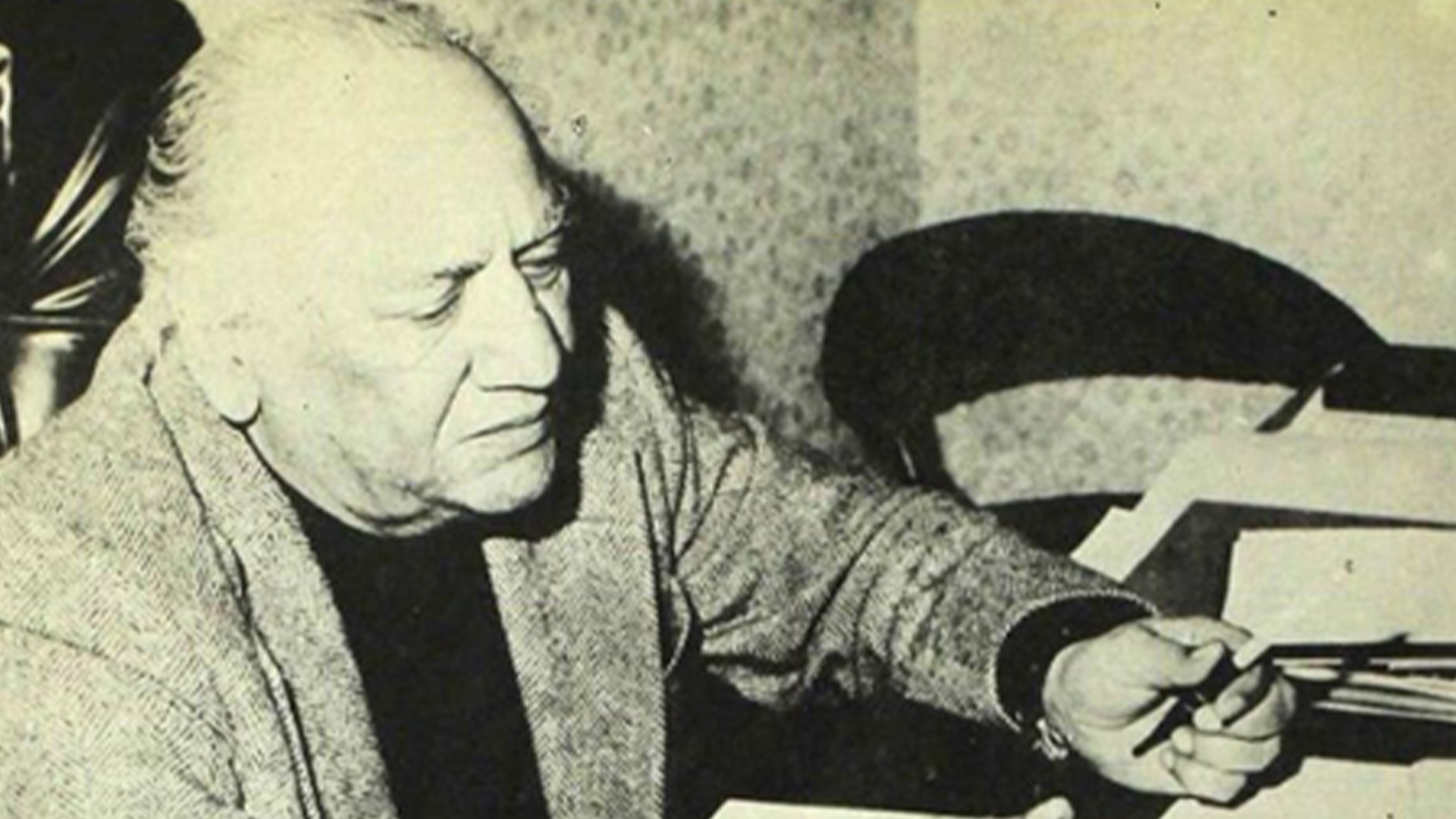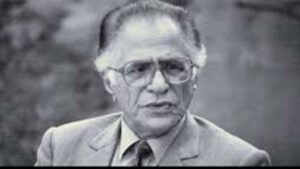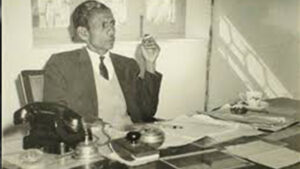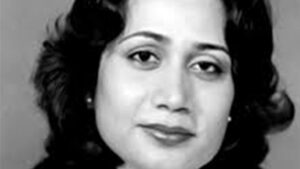Faiz Ahmad Faiz, (13 February 1911 – 20 November 1984), was a renowned Pakistani poet and writer who made significant contributions to Punjabi and Urdu literature. As one of the most celebrated and influential Urdu poets of his era, his works continue to resonate in Pakistan and across the world. Beyond his literary achievements, Faiz was a man of diverse talents and experiences, serving as a teacher, military officer, journalist, trade unionist, and broadcaster. His life and legacy remain a cornerstone of South Asian cultural and literary heritage.
Birth
Faiz Ahmad Faiz was born in Faiz Nagar, British Punjab (now part of Narowal District, Pakistan). He pursued his education at Lahore’s Government College and Oriental College, where he developed his literary and intellectual foundation. Faiz’s career took a multifaceted path: he served in the British Indian Army during World War II and, following the Partition of India, became the editor-in-chief of two prominent newspapers — the English-language Pakistan Times and the Urdu daily Imroze.
An active member of the Communist Party, Faiz’s political convictions were central to his life and work. In 1951, he was arrested and imprisoned for his alleged involvement in the Rawalpindi Conspiracy Case, which accused him of plotting to overthrow Prime Minister Liaquat Ali Khan’s administration in favor of a pro-Soviet left-wing government. This tumultuous period further enriched his poetry, infusing it with themes of resistance, hope, and human struggle.
Family background
Faiz Ahmad Faiz was born on 13 February 1911 in Kala Qader, Sialkot District, Punjab Province, British India (now Faiz Nagar, Narowal District, Punjab, Pakistan), into a Punjabi family of the Tataley clan of Muslim Jutts. His family held the title of Chaudhry, a mark of distinction, and were primarily farmers.
Faiz’s upbringing was enriched by a strong intellectual and literary environment. His father, Sultan Muhammad Khan, was a notable barrister who worked for the British Government and was also an autodidact. Khan authored a biography of Amir Abdur Rahman, the Emir of Afghanistan, showcasing his literary talents. Despite humble beginnings as the son of a peasant and working as a shepherd in his youth, Sultan Muhammad Khan rose to prominence through his education at Cambridge University.
The Faiz household became a hub for poets and writers in their locality, playing a pivotal role in fostering the literacy movement in the region. This early exposure to literary and intellectual discussions significantly influenced Faiz’s worldview and future as a poet and writer.
Education
Faiz Ahmad Faiz was born on 13 February 1911 in Kala Qader, Sialkot District, Punjab Province, British India (now Faiz Nagar, Narowal District, Punjab, Pakistan), into a Punjabi family of the Tataley clan of Muslim Jutts. His family held the title of Chaudhry, a mark of distinction, and were primarily farmers.
Faiz’s upbringing was enriched by a strong intellectual and literary environment. His father, Sultan Muhammad Khan, was a notable barrister who worked for the British Government and was also an autodidact. Khan authored a biography of Amir Abdur Rahman, the Emir of Afghanistan, showcasing his literary talents. Despite humble beginnings as the son of a peasant and working as a shepherd in his youth, Sultan Muhammad Khan rose to prominence through his education at Cambridge University.
The Faiz household became a hub for poets and writers in their locality, playing a pivotal role in fostering the literacy movement in the region. This early exposure to literary and intellectual discussions significantly influenced Faiz’s worldview and future as a poet and writer.
Career
This comprehensive account of Faiz Ahmad Faiz’s life highlights his multifaceted contributions to literature, politics, and society. It portrays a figure who navigated various roles with exceptional impact: as a poet, academic, journalist, communist, military officer, and advocate for human rights. Below is a structured summary for clarity:
Academia and Literary Contributions
- Teaching Career: Faiz lectured on English and British literature at Muhammadan Anglo-Oriental College, Aligarh (1935) and later taught economics and commerce at Hailey College, Lahore (1937).
- Progressive Writers’ Movement: Co-founded the movement in 1936, serving as its first secretary, aiming to promote socialist ideas through literature.
- Publications:
- Editor-in-chief of Adab-e-Latif (1938–1946), a leading Urdu literary magazine.
- Published his first book of poetry, Naqsh-e-Faryadi (1941).
- Authored eight books, blending classical and modern Urdu forms, heavily influenced by Allama Iqbal and Mirza Ghalib.
- Advocated for socialism and humanism in his revolutionary poetry, gaining prominence in South Asia and the Soviet Union.
Military Career
- Commissioned in the British Indian Army in 1942 during WWII, rising to the rank of Lieutenant Colonel.
- Worked as a Public Relations Officer and earned the Member of the Order of the British Empire (MBE) for his services in 1945.
- Resigned in 1947 after witnessing the Kashmir war.
Communist and Political Activities
- Co-founded the Communist Party of Pakistan in 1947 with Sajjad Zaheer, promoting socialist ideals.
- Editor of Pakistan Times, advocating workers’ rights and socialism.
- Active in international forums like the International Labour Organization and World Peace Council.
Rawalpindi Conspiracy and Imprisonment
- Involved in the 1951 Rawalpindi Conspiracy, accused of plotting a leftist coup alongside General Akbar Khan and other communists.
- Arrested and imprisoned for four years, during which he penned some of his most powerful poetry, addressing themes of tyranny and resilience.
- Released in 1955 but faced subsequent arrests for his political views.
Return to Pakistan and Public Service
- Returned in 1964, serving as Rector of Abdullah Haroon College and vice-president of the Pakistan Arts Council.
- Played a significant role in Zulfikar Ali Bhutto’s government as a cultural advisor (1972–1974), promoting arts and education.
Exile and Later Years
- Deeply disheartened by Bhutto’s ousting and execution, Faiz left Pakistan in 1979, seeking asylum in Beirut, where he edited the magazine Lotus.
- Returned to Pakistan in 1982 amidst poor health, continuing to inspire through his poetry until his death in 1984.
Legacy
Faiz remains an iconic figure in Urdu literature and a symbol of resistance against oppression. His fusion of art and activism, along with his unwavering commitment to justice and equality, ensures his enduring influence.
Themes and writing style
Faiz Ahmed Faiz’s poetry reflects an evolution from traditional romantic themes to a broader focus on justice, revolution, and universal human experiences. Below is a detailed exploration of his poetic style, themes, and contributions:
Evolution of Themes
- Early Poetry:
- Initially explored romantic love, beauty, and heartbreak.
- These themes are often intertwined with metaphors of longing and separation, typical of classical Urdu poetry.
- Expansion to Social and Political Concerns:
- Progressed to themes of justice, rebellion, and the interconnectedness of humanity.
- His poetry became a voice for the oppressed, highlighting issues such as poverty, social discrimination, economic exploitation, and political repression.
- Fusion of Love and Revolution:
- Faiz masterfully blended romantic love with revolutionary ideals.
- His unique approach appealed to readers who saw the intertwining of personal emotions with collective struggles as deeply resonant.
- Themes of Home, Exile, and Partition:
- Reflected on the meaning and legacy of the partition of India, often portraying the emotional toll of displacement and exile.
- These themes underscored his deep connection to the sociopolitical fabric of his time.
Stylistic Characteristics
- Progressive Realism:
- Struck a balance between romance and realism, crafting poetry that inspired action without succumbing to overt political rhetoric.
- Avoided “art for art’s sake,” believing art must inspire societal change.
- Ghazal Innovation:
- Skillfully infused socio-political commentary into traditional ghazal motifs of love and separation.
- Maintained conversational and relatable tones in his poetry, in contrast to the classical diction often seen in his prose.
- Use of Symbolism:
- Employed religious and mystical symbolism inspired by Sufi traditions, particularly Rumi.
- His grandson noted that Faiz proposed a form of “Islamic socialism,” integrating spiritual ideals with social justice.
- Hope and Encouragement:
- Despite addressing dire socio-political realities, his works often concluded with hope and optimism for change.
Impact of Life Stages on Poetry
- Incarceration Poetry:
- Written during imprisonment, these works convey themes of resistance, resilience, and a profound sense of yearning for justice.
- Later Poetry:
- Exhibited a universal tone, urging immediate change and action.
- Became more explicit in challenging oppressive traditions, reflecting a sense of urgency in his mature years.
Legacy
Faiz’s body of work is celebrated for its profound humanism, blending personal and political dimensions seamlessly. His revolutionary yet lyrical style earned him the title of an “artistic rebel,” and he remains a beacon for those striving for justice and equality. By infusing conventional poetic forms with socio-political realities, Faiz not only redefined Urdu poetry but also inspired generations to view art as a catalyst for change.
Death and legacy
Faiz Ahmed Faiz, one of Pakistan’s greatest poets and cultural icons, left a lasting legacy through his literary work, ideology, and influence on arts and society. Below is an overview of his final years, recognition, and enduring impact:
Final Years and Death
Faiz passed away in Lahore in 1984 due to complications of lung and heart disease, shortly after being nominated for the Nobel Prize for Literature. His death marked the end of a simple yet impactful life dedicated to poetry, activism, and the pursuit of justice.
Recognition in Pakistan
- Cultural Legacy:
- Faiz’s poetry became immortalized as a symbol of resistance, love, and human dignity.
- Known as the “Poet of the Oppressed,” he is often regarded alongside Allama Iqbal as one of the “Poets of the East.”
- National and International Awards:
- Faiz was awarded the Lenin Peace Prize in 1962, the Soviet equivalent of the Nobel Peace Prize, which bolstered his international reputation and improved Pakistan-Soviet relations.
- Posthumously honored with Pakistan’s highest civilian award, Nishan-e-Imtiaz, in 1990 by the Pakistan People’s Party.
- Impact on Literature and Arts:
- His work inspired generations of poets, writers, and artists. Institutions such as Karachi University and Government College University Lahore established chairs in his honor to promote Urdu literature and his humanistic ideas.
- His poetry remains relevant due to its focus on enduring issues of injustice and inequality.
- Popular Tributes:
- Classical singer Tina Sani described Faiz as a poet of humanity and resistance, whose poetry remains timeless in its themes and relevance to Pakistan’s social issues.
Accolades and Global Influence
- International Recognition:
- Faiz was the first Asian poet to receive the Lenin Peace Prize in 1962. He also won the Lotus Prize for Literature in 1976 and was nominated for the Nobel Prize shortly before his death.
- His acceptance speech for the Lenin Peace Prize remains a powerful testament to his ideals of justice, equality, and love.
- Translations:
- Faiz’s poetry has been translated into numerous languages, including English, Russian, and Punjabi.
- British Marxist historian Victor Kiernan and others translated his works into English, further broadening his reach.
- Faiz himself translated works of notable poets such as Rasul Gamzatov into Urdu, showcasing his appreciation for global literary traditions.
Cultural Legacy in Popular Media
- Coke Studio Pakistan:
- Faiz’s poetry has been celebrated through various musical renditions on Coke Studio, including iconic pieces such as “Bol Ke Lab Azaad Hain Tere,” “Hum Dekhenge,” and “Mujhse Pehli Si Mohabbat.”
- Cinema and Literature:
- His ghazals and nazms, like “Gulon Mein Rang,” have been adapted into films and novels, illustrating their universality.
- Books and Events:
- In 2011, a collection of his poetry, Celebrating Faiz, was published alongside tributes from his family and scholars.
- His works continue to inspire global audiences, featuring in international films, TV shows, and literature.
Faiz Foundation Trust and International Faiz Festival
- Faiz Foundation Trust:
- Established in 2009 to preserve Faiz’s literary heritage, the trust also promotes art, culture, and humanistic values.
- It houses his personal library, rare photographs, manuscripts, and letters, making it a treasure trove for researchers and admirers.
- International Faiz Festival:
- Launched in 2015 at Lahore’s Alhamra Arts Council, the annual festival celebrates Faiz’s legacy through poetry, music, drama, and discussions on human rights.
- The festival serves as a platform for intellectual and cultural exchange, promoting the values Faiz cherished throughout his life.
Enduring Impact
Faiz’s work resonates across generations for its deep empathy, revolutionary spirit, and universal themes of justice and love. His poetry, blending personal emotions with social consciousness, continues to inspire hope, resilience, and the pursuit of a fairer world. Through his timeless verses, Faiz Ahmed Faiz remains not only a literary giant but also a symbol of humanity’s collective struggle for freedom and dignity.
Personal Life
Faiz Ahmad Faiz’s life, relationships, and works reflect his commitment to art, justice, and humanity. Here is a detailed overview of significant aspects of his life, including his marriage, bibliographic contributions, and dramatic adaptations of his work:
Marriage and Personal Life
In 1941, Faiz married Alys Faiz, a British national and a member of the Communist Party of the United Kingdom. Alys, a student at Government College University Lahore where Faiz taught poetry, shared his ideals of justice and activism. Their nikah was held at Pari Mahal in Srinagar, with notable attendees such as Bakshi Ghulam Mohammad and Sheikh Abdullah.
Alys chose Pakistani citizenship and became an active member of the Communist Party of Pakistan, playing a key role during the Rawalpindi Conspiracy Case, where she helped organize communist supporters.
The couple had two daughters:
- Salima Hashmi – A prominent artist and educator.
- Muneeza Hashmi – A respected media personality and cultural activist.
Bibliography
Faiz’s literary contributions span decades, with his poetry capturing themes of love, revolution, and human resilience. Here is a selection of his works:
Poetry Collections
- Naqsh-e-Faryaadi (1941)
- Dast-e-Saba (1953)
- Dast-Tah-e-Sang (1946)
- Nuskha Ha-e-Wafa (1985)
Prose and Other Works
- Humaari Qaumi Saqaafat (1976) – On cultural heritage.
- Tafheem-e-Iqbal – Analysis of Iqbal’s works.
Posthumous and Anthologies
- Intikhaab-e-Faiz Ahmad Faiz (1986)
- Mata-e-Lauh-o-Qalam (1983)
Faiz’s works continue to resonate deeply, with translations in English, Russian, Punjabi, and other languages, expanding his reach across the globe.
Dramatic and Musical Adaptations
Faiz’s poetry and life have inspired numerous stage productions, films, and musical interpretations, celebrating his revolutionary ideas and poetic genius.
Stage Productions and Plays
- Sheeshon ka Maseeha – A dramatic portrayal of his life and works.
- Kuchh Ishq Kiya Kuchh Kaam – A multimedia production highlighting Faiz’s pre-independence years.
- Chand Roz Aur Meri Jaan – A dramatized reading of letters exchanged between Faiz and Alys.
- Jo Dil Pe Guzarti Hai – A play exploring Faiz’s themes of love and resistance.
Musical Renditions
Faiz’s poetry has found its way into iconic performances, particularly in Pakistan’s Coke Studio, which featured:
- Hum Dekhenge – Sung by Iqbal Bano, an anthem of resistance.
- Mujhse Pehli Si Mohabbat – A soulful ghazal performed by Mehdi Hasan and later by Humaira Channa.
- Bol Ke Lab Azaad Hain Tere – Sung by Shafqat Amanat Ali, celebrating freedom of expression.
Legacy in Cinema
Faiz’s poetry has inspired films such as Unfreedom (2015), which explored themes of societal restrictions and the quest for freedom. His ghazal Gulon Mein Rang became immortalized through renditions in Bollywood films like Haider.
Impact and Recognition
Faiz Ahmad Faiz remains a cornerstone of South Asian literature, celebrated for his eloquence and advocacy for social justice. His poetic voice transcends borders and continues to inspire artists, activists, and audiences worldwide. Through his enduring works and their adaptations, Faiz’s legacy remains vibrant and relevant.



